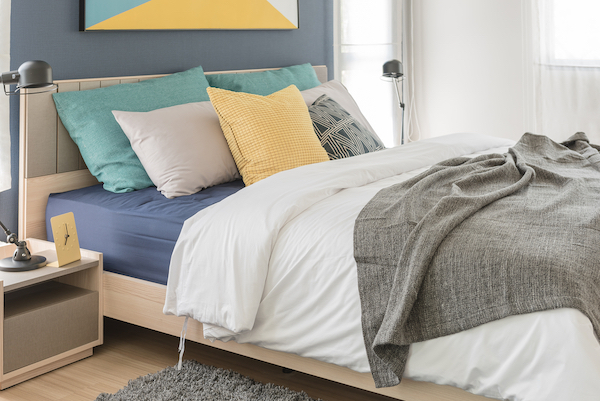
How often do you wash your sheets and put fresh ones on your bed? That’s okay, you don’t need to let anyone else know; you can keep the answer to yourself. However, the best answer is, no longer than two weeks, and less in some cases.
If you and your family are sleeping on sheets that have been on your bed longer than that, then there are some gross and unhealthy things that may be happening in your bedrooms. So be prepared: What follows may not be for the faint of heart.
Read about 5 tips to make doing laundry greener
What’s happening to your sheets
The human (and pet) body sheds skin cells; in fact, 500 million a day for people. Since you spend about one-third of your life in bed, plenty of cells are accumulating in your sheets.
Skin cells are not the only things that are gathering in your bed. Some of those “things” have legs. In addition, moisture from sweating can accumulate during the night, making your sheets a breeding ground. Therefore, according to hygiene physician Dr. Lisa Ackerley, failing to wash your sheets often could be putting you and your family at risk for significant health problems. Let’s explore what those problems might be.
Health hazards when you don’t wash your sheets
Here are a few of the health issues that can arise when you keep your sheets on the bed too long.
Mighty Mites. The dead skin cells that accumulate in your bed linens in between clean sheet replacements are dinner for dust mites that enjoy this delicacy. Mites and their droppings may trigger asthma and allergies and contribute to eczema.
Pet issues. Cat and dog hair and dander are dinner for dust mites as well. In addition, if your canine friend sleeps in your bed and has mange, the mites can irritate your skin. Pet sleep buddies may also transmit ringworm. If you want to allow your pets to sleep with you, be sure to routinely check their health and change your sheets weekly.
Germ garden. Dead skin cells, sweat, saliva, yeast, fecal matter, and other bodily deposits in your bed are a fertile garden for germs to thrive. Some tests, for example, have found that unwashed pillowcases for one week had 17,000 more bacterial colonies than a toilet seat.
One bacterium that can linger in your sheets is Staphylococcus aureus, which is found on both healthy skin and on cuts and other skin conditions. Yeast is another threat, as it can accumulate in folds of skin where there is moisture and result in skin infections.
Acne problems. If you suffer from acne, you should be changing your pillowcase every two to three days. That’s because bacteria, dead skin cells, and dirt in the pillowcase can contribute to outbreaks and clog your pores.
Lingering germs. Whenever you or family members are ill, bacteria and viruses can linger in your sheets for up to several hours, depending on the microorganism. Therefore, it’s a good idea to wash your linens more often to kill germs.
Read about why you need to ditch your dryer sheets
How to wash your sheets
According to a 2017 survey, only 44 percent of Americans wash their sheets once or twice a month. Eleven percent wash them once a season, and 5 percent do it only once or twice a year. However, the optimal sheet washing schedule is once every two weeks, but once a week if you sweat a lot or if you are allergic to dust mites. In the latter case, the water should be at least 130 degrees Fahrenheit so you will kill the mites.
If you or a family member is sick, then sheets and other bedding should be changed as soon as you or the family member feels better to reduce the risk of reinfection. Use hot water to kill the germs and a hot dry cycle.
Use an all-natural laundry detergent to keep your sheets and your skin free of exposure to potentially harmful chemicals. It’s also suggested you be as environmentally responsible as possible. It’s a dirty world, and littering with plastic and cardboard laundry containers adds to the landfill. Even with recycling…and so many people don’t recycle responsibly…the amount of trash is overwhelming.
You can help make a difference by reducing laundry packaging waste and using detergent strips. These strips are plastic-free, dissolve in both hot and cold water, and are free of harmful chemicals. The small amount of packaging they are in consists of 100 percent recycled materials.
Other tips
- Don’t make your bed right away in the morning. Allow any moisture that may have accumulated in your sheets to dry, this makes them less attractive to bacteria and mites.
- Use a mattress protector and pillow protectors, which are easy to wash.
- Shower or bathe before going to bed. This helps reduce dirt and other contaminants in your bed.
- Provide a separate blanket for your dog or cat to lie on in your bed and wash it once a week.
Bottom line
Do your part for yourself, your family, and the planet. Wash your sheets more often and help protect your family’s health. Consider using environmentally friendly detergent and help keep our planet healthy as well.





